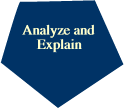 |
||||
Community |
||
Environmental |
||
Occupational |
||
CALENDAR |
||||||||||||||

EPA previously instituted a 'Trade and Cap' program for CO2 (carbon dioxide) releases. The approach of the program was that a certain total amount of CO2 could be released within each state and industry would have this total release divided up among itself. A manufacturer could then sell credits for amounts of its designated portion that it would not emit, usually due to greater efficiencies and/or new equipment. Because of the success of this program it was proposed to extend it to mercury emissions. The difference with mercury is that because it is a heavy metal it tends to fall to the ground and accumulate near its source. Carbon dioxice, being a gas, disperses rapidly and spreads out over large areas, so that it is greatly diluted. The concern with the mercury program is that companies that purchase credits, allowing greater emission of mercury, will increase concentrations of mercury within the surrounding communities. This will be addressed in upcoming articles.

